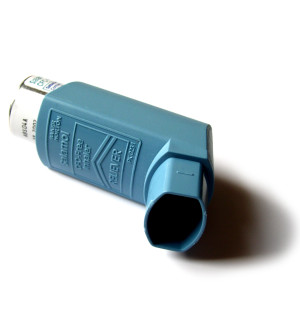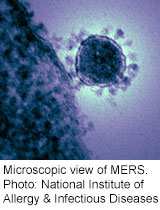- The Best Time of Day to Drink Bone Broth to Maximize Health Benefits
- 8 Ways to Increase Dopamine Naturally
- 7 Best Breads for Maintaining Stable Blood Sugar
- Gelatin vs. Collagen: Which is Best for Skin, Nails, and Joints?
- The Long-Term Effects of Daily Turmeric Supplements on Liver Health
- Could Your Grocery Store Meat Be Causing Recurring UTIs?
- Are You Making This Expensive Thermostat Error This Winter?
- Recognizing the Signs of Hypothyroidism
- 10 Strategies to Overcome Insomnia
- Could Artificial Sweeteners Be Aging the Brain Faster?
2 Florida Hospital Workers Who Treated MERS Patient Fall Ill


Two Florida hospital workers who helped treat a man with the second diagnosed case of MERS in the United States have developed respiratory symptoms, according to published reports.
The workers are being tested to see if they may have caught the potentially fatal virus from the man, hospital officials said.
One of the cases probably isn’t MERS because the worker started experiencing symptoms just one day after treating the 44-year-old patient. The incubation period for MERS is typically five days, NBC News reported Tuesday.
“We want to be extra cautious,” said Dr. Antonio Crespo, infectious disease specialist and chief quality officer for the P. Phillips Hospital in Orlando. “These two people were in contact with the patient without a mask.”
One of the staffers was sent home after treatment. The other one is in a special isolation room at the hospital, as is the MERS patient, NBC News reported.
The MERS virus first surfaced in the Middle East two years ago, and the vast majority of cases have been reported in that region of the world.
News of the second U.S. case of MERS was announced Monday by federal health officials.
Like the first U.S. case identified earlier this month, the second case involved a health care provider who lived and worked in Saudi Arabia, the epicenter of the MERS outbreak. The second patient — an unidentified man — was being treated at the Orlando hospital and was said to be doing well.
The health risk to the general public is very low, federal officials said Monday, because the virus is only passed through close contact.
The second patient worked in a facility in Saudi Arabia that cared for MERS patients. The patient was visiting family in central Florida before entering the hospital. The patient had traveled from Saudi Arabia to London to Boston to Atlanta, before reaching Florida, officials said.
The patient felt unwell on a May 1 flight to London, but sought care in Orlando. The U.S. Centers for Disease Control and Prevention said it has notified all passengers on the affected flights to be on the lookout for symptoms.
MERS symptoms typically include shortness of breath, coughing and fever.
However, Dr. Anne Schuchat, director of the U.S. National Center for Immunization and Respiratory Diseases, said Monday that it is “likely that if you have not already developed symptoms you are not likely to.”
CDC Director Dr. Tom Frieden said his agency was contacting the airlines on which the patient traveled, but the risk to people traveling with a person infected with MERS is unknown.
CDC officials cautioned that while the patient felt the symptoms of the MERS virus while traveling from Saudi Arabia, it wasn’t clear if the patient was infectious at that time.
There are 538 confirmed cases of MERS worldwide, and 145 deaths. The vast majority of cases and deaths — 450 and 118, respectively — have occurred in Saudi Arabia.
One-fifth of all MERS cases have occurred among health care workers, Schuchat said.
Frieden added, “We would not be surprised to see more cases, but we are not predicting there will be.”
On April 28, another U.S. health care worker who’d had close contact with MERS patients in Saudi Arabia was admitted to an Indiana hospital and was later diagnosed with the respiratory ailment.
He was released from Community Hospital in Munster on Friday.
MERS kills about one-quarter of the people who contract the virus, Schuchat said at a May 2 news conference.
In some countries, the virus has spread from person to person through close contact, such as caring for or living with an infected person. But, there’s currently no evidence of sustained spread of MERS in general settings, the CDC has said.
The first patient took a plane on April 24 from Riyadh, Saudi Arabia, to London, then from London to Chicago. He then took a bus from Chicago to Indiana. On April 27, he started experiencing “respiratory symptoms,” and was admitted to Community Hospital the next day, the CDC said.
Camels have been identified as carriers of MERS, but it’s not known how the virus is being spread to people.
More information
For more on MERS, visit the World Health Organization.
Source: HealthDay
Copyright © 2026 HealthDay. All rights reserved.










